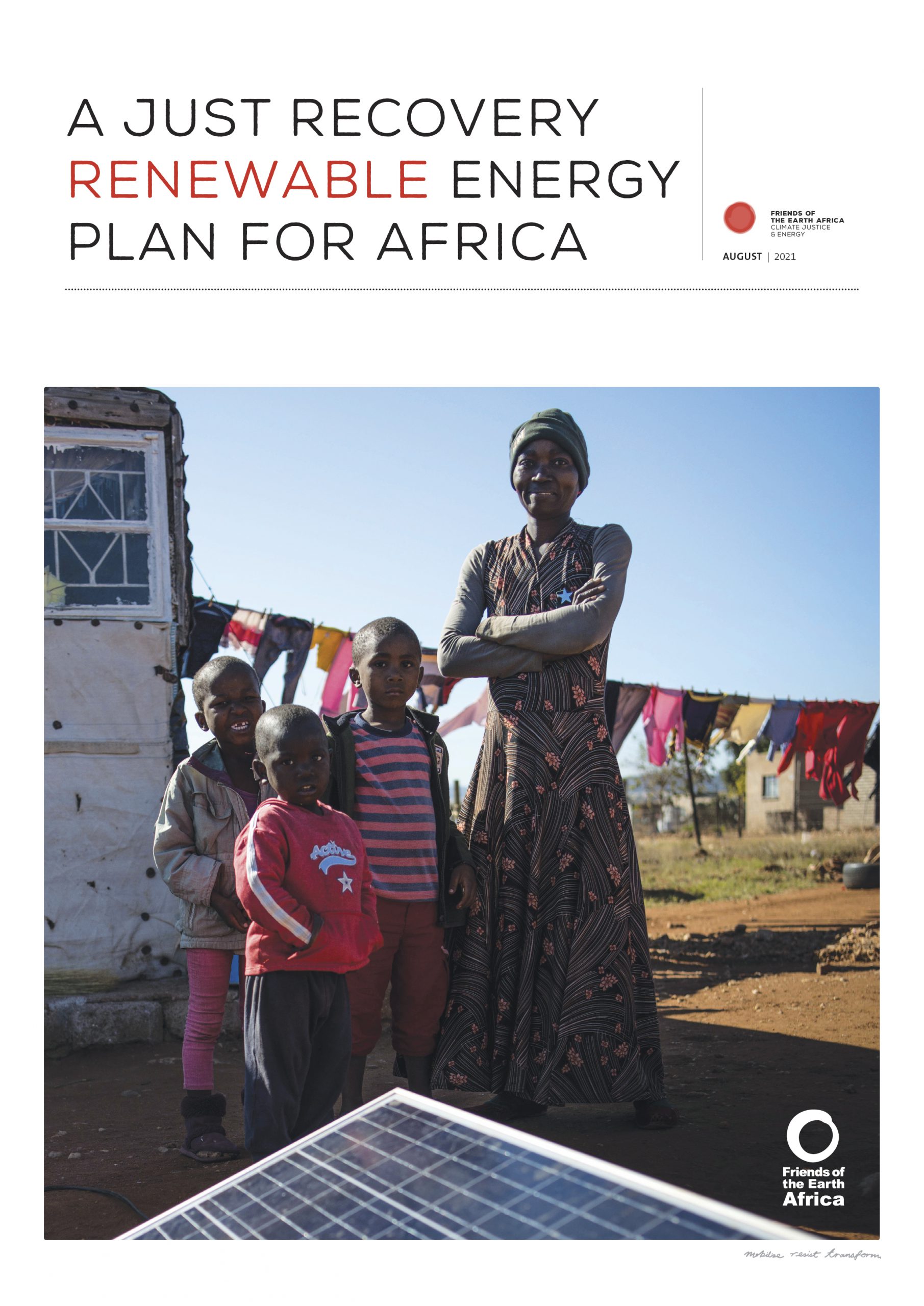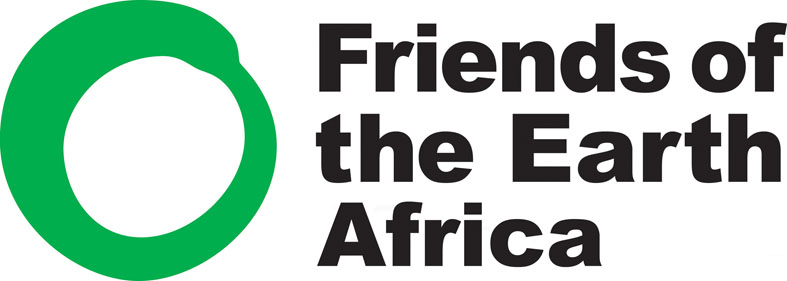
IMMEDIATE RELEASE
Friends of the Earth Africa
Just Recovery Renewable Energy Plan for Africa Launched by Friends of the Earth Africa
50 organisations endorse the Plan
__________________________________
Friends of the Earth Africa today launched ‘A Just Recovery Renewable Energy Plan for Africa’ which offers a practical and much-needed opportunity to change the trajectory of energy development, distribution and access on the African continent. The report stresses the urgency to democratise energy systems, reduce the power of transnational corporations and enable peoples and communities to access sufficient energy to live a dignified life.
The report which was launched during a webinar with key climate justice voices demands a complete shift from current dirty energy systems to achieve 100% Renewable Energy in Africa. The plan found that it is technically and financially feasible, with an annual investment requirement of around US$130 billion per year. It lays out clear targets for this vision, with over 300GW of new renewable energy by 2030, as agreed by the African Union, and over 2000GW by 2050. It also shows that the finance and investment needed to achieve the 100% renewable energy goal can be done through public finance from the global North, ending tax dodging and dropping the debt.
Providing key insights of the report, Dipti Bhatnagar, the coordinator of the Climate Justice and Energy program for Friends of the Earth International, said:
“People are facing multiple crises on this continent. We need to stop the climate crisis and bring about a just and feminist energy transition that actually serves the need of people and planet. This report shows the way to power Africa with renewable energy while also trying to stem the climate crisis, supporting employment, gender justice, reducing inequality and pushing for a just recovery. The finance for this exists. We demand our leaders show the political will for this urgent transition.”
This view was shared by another panellist, Kwami Kpondzo of Friends of the Earth Togo, who said:
“It is time for African governments, public and private financial institutions to end their interest and investment in dirty energy in Africa and open the doors further for democratised, low-cost renewable energy accessible to all including women, youth, local communities and indigenous peoples”.
The discussions and comments during the launch highlighted the importance of understanding the potential of RE to affect different sectors and groups of society, specifically women. Trusha Reddy, Programme Head for Energy & Climate Justice at WoMin African Alliance stressed that “our governments can either go with increasing energy access through clean energy that supports and is led by women or to get locked into dirty energy and drive us to climate and ecological crisis.”
The report explores the loss of human life and the damage to African economies wrought by Covid-19 that has exposed the chronic weaknesses and injustices in the continent’s energy and health systems. The challenges of renewable energy are being experienced throughout the continent. Hamza Hamouchene of Transnational Institute shared the experiences in North Africa and stated:
“a swift energy transition to renewables is becoming inevitable even in mainstream discussions and policy fora. What the FoE Africa report highlights is the need for political will from those who are governing us as well as the necessary funding. This would entail stopping the wealth drain from Africa, the ending of debt servitude and the payment of ecological and climate debts owed to countries of the global South. The report also aptly grapples with one fundamental question which is how we make sure that this transition can be just, inclusive and democratic without reproducing the same patterns of dispossession and enclosure.”
Similarly, Omar Elmawi, the campaign coordinator of the Stop East African Crude Oil Pipeline and deCOALonize campaigns, from Kenya, made an appeal to elected officials. Elmawi said: “to see avoiding emissions as an opportunity and not a burden. It is time to shift gears and move away from this path that is leading us to destruction.”
The Plan would bring electricity to hundreds of millions and create over 7 million jobs in order to drive a Just Recovery from COVID, address climate change and reduce inequality. It includes a political statement that has been signed and endorsed by 50 organisations across the continent – all echoing the demand for clean and affordable energy for hundreds of millions of Africans, that governments must take effective measures to prevent the Corporate Capture of democracy and stresses the possibility of a Just Recovery Renewable Energy Plan for a 100% Renewable Energy in Africa.
FOR EDITORS:
The report can be accessed at the links below:
ENGLISH : foeafrica.org/wp-content/uploads/2021/08/FoE-Africa-Just-Recovery-Energy-Plan-for-Africa-ENG.pdf
FRENCH: foeafrica.org/wp-content/uploads/2021/08/FoEI-Africa-Just-Recovery-Energy-Plan-for-Africa-FR-mr.pdf
PORTUGUESE: foeafrica.org/wp-content/uploads/2021/08/FoEI-Africa-Just-Recovery-Energy-Plan-for-Africa-PT-mr.pdf
The Political Statement on the Just Recovery Renewable Energy for Africa via the links below:
ENGLISH : http://foeafrica.org/wp-content/uploads/2021/08/FoEI-Africa-Just-Recovery-Energy-Plan-for-Africa-political-statement-ENG-rhr.pdf
FRENCH: http://foeafrica.org/wp-content/uploads/2021/08/Declaracao-Politica-Plano-Renovaveis-Energia.pdf
PORTUGUESE: http://foeafrica.org/wp-content/uploads/2021/08/Declaracao-Politica-Plano-Renovaveis-Energia.pdf
For media enquiries contact:
Ekue Assem, Friends of the Earth Africa Communications Coordinator: +228 93 84 19 30 or info.com@amiterre.org
Dipti Bhatnagar, Climate Justice and Energy Coordinator, Friends of the Earth International: +258 84 035 6599 or dipti@foei.org
Philip Jakpor, Director of Programmes Corporate Accountability and Public Participation Africa: +234 803 725 6939 or jakporphilip@gmail.com
